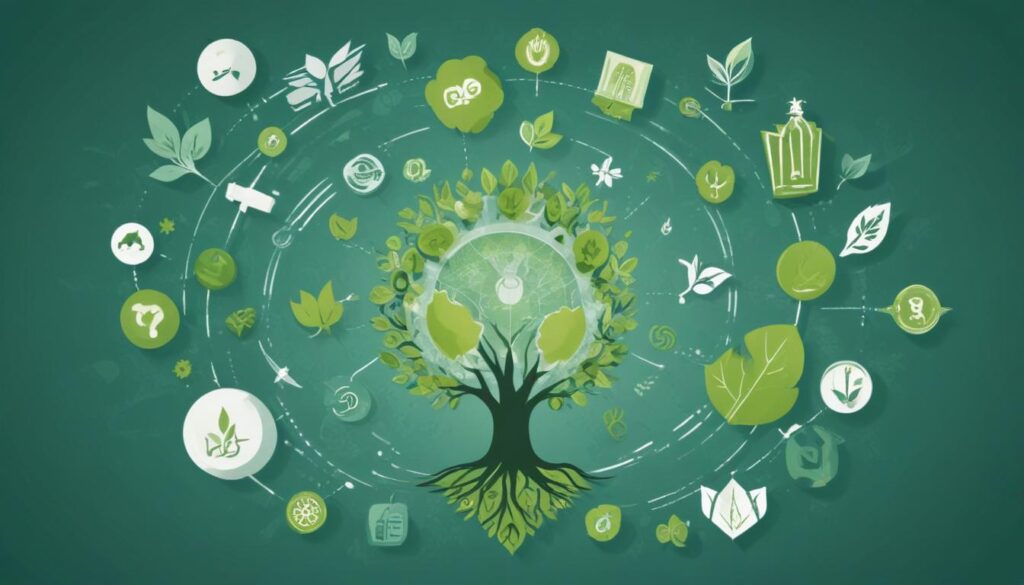Sustainability in manufacturing focuses on adopting renewable energy, enhancing resource efficiency, and implementing circular economy principles to reduce environmental impact and promote eco-friendly practices across industries.
In today’s evolving landscape, **renewable energy** is reshaping the way businesses operate. With companies like General Motors leading the charge, it’s essential to explore how this transition impacts supply chain dynamics and sustainability efforts.
Introduction to Renewable Energy Strategy
The shift towards renewable energy is not just a trend; it’s a necessity for sustainable business practices. Companies are increasingly recognizing the need to integrate renewable resources into their operations to reduce environmental impact.
Key Strategies for Implementation: One effective approach includes partnering with established experts in the field. Collaborations with companies specializing in renewable technologies can lead to robust supply chain solutions that align with sustainability goals. Tailored strategies enhance efficiency and create competitive advantages.
Additionally, investing in renewable technologies can provide long-term cost savings. Businesses that leverage solar, wind, or other renewable sources often benefit from lower utility bills and reduced reliance on fossil fuels. This trend not only supports corporate responsibility but also enhances brand value among eco-conscious consumers.
Furthermore, educating suppliers on the importance of transitioning to renewable energy contributes to a more sustainable supply chain. Workshops and shared resources on best practices can empower all stakeholders involved, fostering a culture of sustainability that transcends the organization.
The Role of General Motors in Renewables
General Motors (GM) has taken significant strides in advancing its role in the renewable energy sector. As part of its commitment to sustainability, GM focuses on reducing carbon emissions across its operations and supply chain. This initiative aligns with global efforts to combat climate change.
Innovative Partnerships: One key aspect of GM’s strategy is establishing partnerships with renewable energy providers. By collaborating with companies that specialize in sustainable resources, GM enhances its manufacturing processes and integrates green energy solutions. This not only boosts efficiency but also positions GM as a leader in eco-friendly automotive solutions.
Moreover, GM is investing heavily in electric vehicle (EV) technology, which is pivotal for reducing reliance on fossil fuels. The company’s commitment to launching a diverse range of EV models reflects its proactive approach to meet rising consumer demand for sustainable transportation options.
Additionally, GM’s dedication to supply chain sustainability extends to its suppliers, providing them with the tools and knowledge necessary to embrace renewable energy. This collective effort supports a more resilient and environmentally friendly automotive industry.
Collaboration with Trio on Sustainability
GM’s collaboration with Trio exemplifies how partnerships can accelerate sustainability initiatives within the automotive sector. By joining forces, these two entities aim to innovate solutions that address pressing environmental challenges faced by the industry.
Shared Goals and Vision: This partnership revolves around a mutual commitment to reducing carbon footprints and promoting renewable energy usage. Together, GM and Trio work on developing advanced technologies that make manufacturing processes more efficient and environmentally friendly.
One significant aspect of this collaboration is the focus on educating and training suppliers in sustainable practices. GM, leveraging Trio’s expertise, provides resources that empower suppliers to adopt cleaner energy solutions and minimize waste throughout their operations.
Furthermore, the partnership explores new avenues for renewable energy integration, ensuring that both companies contribute to a more sustainable future. This approach not only enhances corporate social responsibility but also aligns with changing consumer preferences that increasingly favor eco-friendly products.
Ultimately, the collaboration serves as a model for how businesses can unite towards common goals, showcasing the power of cooperation in tackling environmental issues while driving innovation within the automotive industry.
Key Insights from the Panel Discussion
The recent panel discussion on sustainability brought together industry leaders who shared critical insights into evolving practices within the automotive sector. Participants emphasized the importance of renewable energy integration and its potential to drive significant change.
Strategies for Success: One key takeaway was the necessity for automakers to invest in innovative technologies. These advancements not only support green initiatives but also enhance operational efficiency. The panelists highlighted the role of electric vehicles (EVs) as a cornerstone in achieving carbon neutrality.
Another important aspect discussed was the collaboration between companies and renewable energy providers. By forming strategic alliances, businesses can access cutting-edge solutions that facilitate a smoother transition to sustainable practices. This collaboration fosters a shared commitment to reducing greenhouse gas emissions.
Furthermore, the discussion underscored the need for ongoing education and training within the supply chain. Engaging suppliers in sustainability practices ensures a unified approach to environmental responsibility. This education helps enhance awareness and empowers partners to adopt cleaner technologies.
Overall, the insights from this panel discussion pave the way for a more sustainable future in the automotive industry, highlighting a collective responsibility to embrace change for the planet.
Innovative Renewable Procurement Options
The landscape of renewable procurement is rapidly evolving, offering businesses innovative options to enhance their sustainability efforts. Companies are increasingly recognizing that strategic sourcing of renewable energy is essential for meeting corporate sustainability goals.
One prominent option is the use of power purchase agreements (PPAs). These agreements allow organizations to buy energy directly from renewable sources, effectively locking in prices and supporting the development of new renewable projects. This method not only helps stabilize energy costs but also promotes long-term partnerships with energy suppliers.
Another innovative approach involves community solar projects, where businesses can invest in local solar farms. This model enables companies to harness renewable energy without the need for on-site installations. By participating in community solar, businesses can reduce their carbon footprint while supporting local economies.
Moreover, advancements in technology have led to green energy certificates and blockchain solutions that enhance transparency and traceability in renewable energy sourcing. These innovations provide companies with verifiable proof of their renewable energy use, strengthening their sustainability claims to stakeholders.
Overall, these innovative renewable procurement options not only drive environmental benefits but also create new economic opportunities for businesses committed to sustainability.
Impact of Renewable Energy on Supply Chain
The integration of renewable energy into supply chains is transforming how businesses operate. By sourcing energy from renewable sources, companies can significantly reduce their carbon footprint and promote environmental sustainability.
Efficiency and Cost Savings: Utilizing renewable energy often leads to cost savings in the long term. Companies can stabilize energy costs by investing in solar panels or wind turbines, mitigating risks associated with fluctuating fossil fuel prices. This stability can enhance overall operational efficiency, allowing businesses to allocate resources more effectively.
Additionally, transitioning to renewable energy can improve supply chain resilience. As companies face increasing regulatory pressures to adopt sustainable practices, those that lead in clean energy adoption position themselves favorably in the market. This proactive approach not only meets consumer expectations but also opens doors to new business opportunities.
Innovation in Transportation: The impact of renewable energy extends to logistics and transportation as well. With the rise of electric vehicles (EVs) and other green technologies, companies can further minimize their environmental impact while maintaining efficiency in their supply chains.
Ultimately, the embrace of renewable energy within supply chains enhances sustainability and competitiveness. The shift toward cleaner alternatives is reshaping how businesses view energy procurement and environmental responsibility.
Education for Suppliers on Decarbonisation
Education for suppliers on decarbonisation is essential for fostering a sustainable supply chain in the automotive industry. As companies strive to meet environmental goals, it is crucial to equip suppliers with the knowledge and tools necessary to reduce their carbon emissions effectively.
Targeted Training Programs: Implementing targeted training programs focused on best practices and innovative techniques in sustainability can help suppliers make informed decisions. These programs should cover key areas such as energy efficiency, waste reduction, and sustainable sourcing. By sharing expertise, companies can encourage suppliers to adopt greener practices.
Moreover, providing resources such as guidelines, templates, and case studies enables suppliers to understand how to transition smoothly to low-carbon operations. Workshops and hands-on sessions can also enhance learning and engagement, allowing suppliers to ask questions and share experiences in a collaborative environment.
Another important aspect is fostering a community of suppliers interested in sustainability. Creating forums or networks can encourage knowledge sharing and collaboration among partners. This sense of community promotes accountability and inspires suppliers to pursue continuous improvement in their decarbonisation efforts.
Ultimately, investing in education for suppliers not only supports decarbonisation goals but also strengthens partnerships, ensuring a collective commitment to sustainability across the entire supply chain.
Importance of Collective Action
The importance of collective action in driving sustainability cannot be overstated. In the context of climate change and environmental preservation, collaboration among businesses, government, and communities is crucial for achieving significant impact.
When companies band together, they can share resources and best practices, enhancing individual and collective outcomes. For instance, participating in industry coalitions allows firms to tackle shared challenges, such as reducing carbon footprints and optimizing supply chains. This collaborative approach fosters innovation, as businesses can learn from each other’s successes and failures.
Engaging Stakeholders: Involving stakeholders from different sectors, including NGOs and local communities, enriches the decision-making process. These collaborations create a comprehensive understanding of environmental issues and lead to more effective solutions. Engaging with diverse perspectives also helps businesses build trust and credibility among their customer base.
Moreover, collective action can amplify advocacy efforts. When companies unite to promote sustainable policies or initiatives, they can exert greater influence on legislators and regulators. This unified voice can lead to more favorable policies that support sustainability goals.
In conclusion, forging partnerships and alliances is essential in the fight against climate change. By working together, organizations can accelerate progress towards a more sustainable future.
Trio’s Role in Supporting Supply Chains
Trio plays a vital role in supporting supply chains through innovative solutions aimed at enhancing sustainability and efficiency. By providing advanced tools and resources, Trio enables businesses to adapt to the evolving demands of the market while prioritizing environmental responsibility.
Data-Driven Insights: Utilizing data analytics, Trio helps organizations optimize their procurement processes. This includes assessing the carbon footprints of suppliers and identifying areas for improvement. By offering actionable insights, Trio empowers companies to make informed decisions that align with their sustainability goals.
Furthermore, Trio’s platform facilitates collaboration among suppliers, manufacturers, and retailers. By fostering an ecosystem where stakeholders can easily share information, Trio enhances communication and transparency throughout the supply chain. This collaboration is essential for building resilience, especially in times of disruption.
Trio also provides training and resources to suppliers, educating them on best practices for sustainable operations. This includes identifying renewable energy sources and implementing waste reduction strategies. By investing in supplier education, Trio helps create a more sustainable supply chain.
Ultimately, Trio’s commitment to sustainability not only supports individual companies but also contributes to a larger movement toward a greener economy. Their innovative approach sets a standard for how supply chains can operate effectively while minimizing environmental impact.
Tools for Renewable Energy Procurement
Effective renewable energy procurement relies on a variety of tools designed to streamline processes and ensure sustainable energy sourcing. These tools help organizations navigate the complexities of the renewable energy market while maximizing efficiency and reducing costs.
Energy Management Software: One vital tool is energy management software, which allows companies to monitor and analyze their energy consumption patterns. By providing data insights, this software helps identify opportunities for integrating renewable energy sources, leading to informed decision-making.
Additionally, analytics platforms deliver critical evaluations of renewable energy options available in the market. By comparing different sources, such as solar, wind, and hydro, businesses can determine which options best suit their operational needs and sustainability goals.
Power Purchase Agreements (PPAs) management tools are also essential. These facilitate direct negotiations between energy producers and consumers, ensuring favorable terms while enabling long-term investments in renewable infrastructure. Such agreements can provide stability in energy pricing and contribute to overall cost savings.
Moreover, platforms focused on community solar projects enable businesses to invest in local solar farms without needing to install systems on their properties. This builds a stronger connection to the community while promoting sustainability.
Building a Sustainable Future in Manufacturing
Building a sustainable future in manufacturing is crucial for tackling environmental challenges and meeting global energy demands. As industries evolve, the integration of sustainable practices becomes increasingly important in manufacturing processes.
Resource Efficiency: One key aspect of sustainable manufacturing is enhancing resource efficiency. Companies are adopting lean manufacturing principles, which focus on minimizing waste while maximizing productivity. This approach not only conserves materials but also reduces energy consumption, contributing to a lower carbon footprint.
Additionally, implementing renewable energy sources in manufacturing facilities is gaining traction. Utilizing solar, wind, or other renewable energy reduces reliance on fossil fuels, aligning operations with sustainability goals. Businesses that invest in renewable energy can stabilize costs and improve their green credentials.
Moreover, incorporating circular economy strategies is essential. This involves designing products for longevity and recyclability, enabling materials to be reused instead of discarded. By embracing circular practices, manufacturers can significantly reduce waste generation.
Collaboration with suppliers and stakeholders is vital in this journey. By engaging with partners focused on sustainability, manufacturers can foster innovation and drive progress towards a more sustainable industry.
Conclusion and Future Prospects for Sustainability
As the world faces mounting environmental challenges, the future prospects for sustainability in various industries hinge on innovative strategies and collective action. Companies globally are increasingly recognizing the importance of sustainable practices and their role in mitigating climate change.
Adopting renewable energy and enhancing resource efficiency are key components of this transformation. Organizations that invest in green technologies not only reduce their carbon footprints but also position themselves as leaders in sustainability, appealing to environmentally conscious consumers.
Collaboration among stakeholders is essential for fostering a culture of sustainability. When businesses, regulators, and communities work together, they can create robust frameworks that support sustainable development. This synergy leads to the sharing of best practices and the implementation of effective policies.
Moreover, education and awareness play a vital role in shaping sustainable behaviors. Equipping employees and stakeholders with knowledge about sustainability initiatives empowers them to contribute positively. Engaging in transparent communication about sustainability goals fosters trust and encourages collective responsibility.
Looking ahead, the integration of sustainability into corporate strategies will likely continue to gain momentum. Organizations that embrace this shift will not only contribute to a healthier planet but also enhance their resilience and competitiveness in an increasingly eco-conscious marketplace.
In Summary: The Path to a Sustainable Future
Building a sustainable future requires collective effort from businesses, communities, and individuals. By adopting renewable energy, enhancing efficiency, and collaborating with stakeholders, we can significantly reduce our environmental impact.
Education and awareness are key to encouraging positive change. When everyone understands the importance of sustainability, they can contribute to effective solutions. Together, we can create a culture of sustainability that drives innovation and progress.
Looking forward, organizations that prioritize sustainable practices will not only protect the planet but also find new opportunities for growth and success. Embracing sustainability is not just a choice; it is a responsibility that will shape our future.
By working together towards common sustainability goals, we can pave the way for a healthier Earth and a better quality of life for future generations.
Frequently Asked Questions
What steps can businesses take to become more sustainable?
Businesses can start by adopting renewable energy, improving energy efficiency, reducing waste, and sourcing sustainable materials.
How does education contribute to sustainability efforts?
Education helps raise awareness about sustainable practices and empowers individuals and companies to make informed decisions that benefit the environment.
What are the benefits of using renewable energy sources?
Using renewable energy reduces carbon emissions, decreases reliance on fossil fuels, and can lead to cost savings in the long run.
Why is collaboration important in sustainability initiatives?
Collaboration allows businesses, governments, and communities to share resources, knowledge, and strategies, making sustainability efforts more effective.
What role does technology play in promoting sustainability?
Technology, such as energy management software and data analytics, provides insights that help organizations optimize energy use and reduce waste.
How can companies measure their sustainability progress?
Companies can measure progress by tracking key performance indicators (KPIs) related to energy use, waste reduction, and overall environmental impact.


